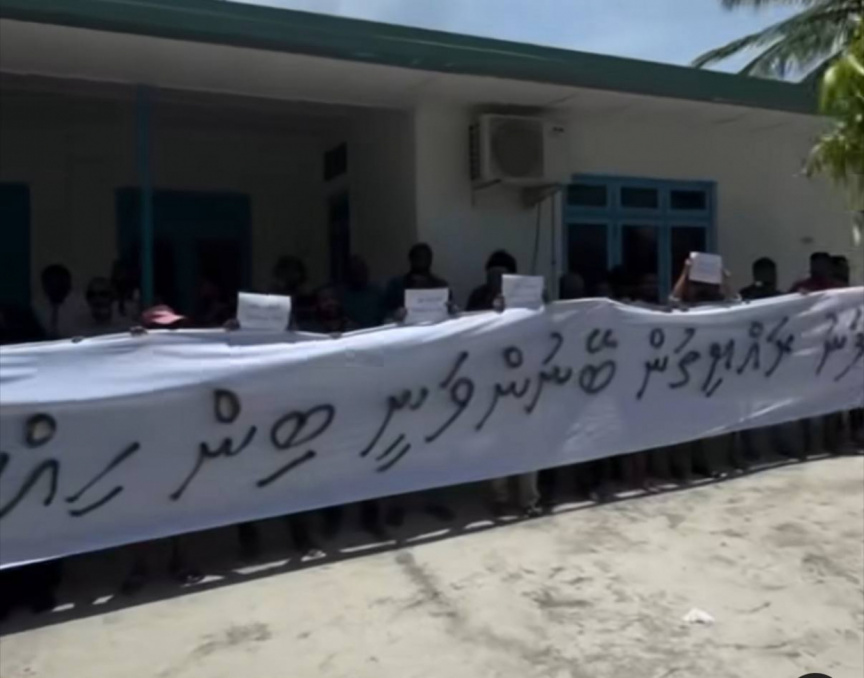
Residents of B. Dhonfanu protest against decision to drop a land reclamation project in the island on September 9, 2025.
The residents of B. Dhonfanu stages a protest on Tuesday, after President Dr. Mohamed Muizzu decided to scrap a project to reclaim land in the island, following widespread concerns over the potential damage to Hanifaru Bay, a UNESCO biosphere reserve that lies nearby.
On August 13, Maldives Transport and Contracting Company (MTCC) was awarded a contract to reclaim 13 hectares of land in Dhonfanu, a small island with a population of some 400 people. The agreement was signed during President Muizzu’s visit to the island, and drew criticism from environmental advocates over its implications for Hanifaru Bay, which is among the most important marine habitats in the Maldives.
In a post on X on Tuesday morning, President Muizzu said he has decided to scrap the project in light of public concern over its potential environmental implications.
However, this decision did not sit with some residents of Dhonfanu, who gathered outside the council office urging the government to proceed with the project.
Abdulla Ahsan, a member of Dhonfanu Council, told Sun that President Muizzu announced the decision without consulting with the council or people of the island.
“The residents of this island want land reclamation. There are 630 people registered to this island. So many people applied the last time we opened applications for land plots. But there’s no more land to issue,” he said.
When asked about the environmental concerns regarding the project, Ahsan said he acknowledges the concern over potential damage to Hanifaru Bay.
But he said that sedimentation had also affected Hanifaru Bay when neighboring B. Dharavandhoo was dredged for the airport extension project.
“Back then, we wouldn’t even see below because the waters got so murky. This begs the question of why there’s so much fuss being made when it comes to reclaiming land in this island,” he said.
When asked for an opinion on relocating to a larger island instead of reclaiming land in Dhonfanu, Ahsan said the council has always supported the concept of relocation in theory.
“That is something that will cut costs and save money. But we wish to reclaim land here because this is a tourist hotspot, and because we want to lease big land plots for guesthouses and such. That will increase the island’s revenue and will lead to prosperity of our people,” he said.
Housing Minister Dr. Abdulla Muthalib has said that while the land reclamation project has been dropped, the government will be running a harbor development and coastal protection project in Dhonfanu.
Hanifaru Bay is recognized as one of the most important marine habitats in the Maldives, serving as a critical feeding and breeding ground for several vulnerable and endangered species, including whale sharks, reef manta rays, napoleon wrasse, as well as protected marine turtles.
The commencement of reclamation works in Dhonfanu had sparked a petition on Change.org, calling for an immediate halt to dredging operations, stressing that Hanifaru Bay is crucial feeding and mating ground for endangered species, and warning that the potential threat from the project is not solely environmental but extends to economic and cultural dimensions.
Concerns outlined in the petition included the risk of sedimentation caused by dredging, which could disrupt the marine water cycle and endanger plankton populations, the microscopic organisms that form the foundation of the food chain for reefs and larger marine life, the decline of which could have widespread consequences for the ecosystem.
The petitioners warned that the project poses a threat not only to the survival of individual species but also to the future of the island communities whose existence is deeply tied to the sea.
The petition titled 'Stop the 13-Hectare Land Reclamation Threatening Hanifaru Bay’s Marine Ecosystem' has over gathered over 1,000 verified signatures.